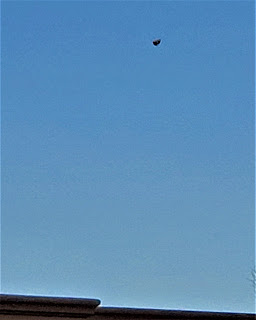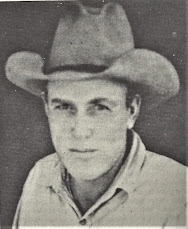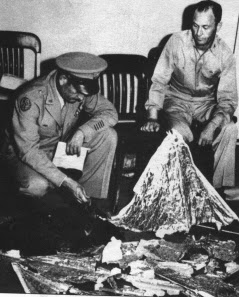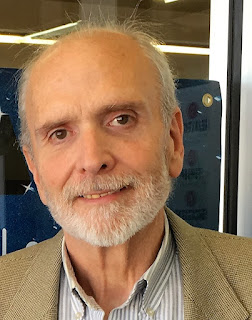About
once a decade, someone challenges the information and the reporting of what
Brigadier General Arthur Exon said to Don Schmitt and me in 1990. True, there
were several challenges at that time and a number of writers did what they
could to .jpg) |
| General Exon |
dismiss Exon’s statements without bothering to interview him though
Karl Pflock did call him in 1992.
In
Pflock’s book, Roswell: Inconvenient Facts and the Will to Believe, he
mentions Exon only briefly in two places. On page 36, Pflock wrote:
In
1989, Roswell authors Randle and Schmitt located retired Air Force Brig. Gen.
Arthur E. Exon. The general was stationed at Wright Field in July 1947 as a
lieutenant colonel and student at the Air Force Institute of Technology,
following an assignment on the staff of the Air Materiel Command, also at
Wright Field. According to Randle and Schmitt, Exon was aware alien bodies and
debris from Roswell were on the base and knew of research being conducted on
the debris. Randle and Schmitt also reported that Exon told them he flew over
what may have been the debris field and crash site and knew of a high-level
group established to control “access to the wreckage, bodies and information
about the crash.” As we will see, General Exon has quite a different take on
what he actually said and intended to convey.
This
really doesn’t say much but it does, to some extent, provide an introduction to
Exon and a suggestion that our reporting, that is Don’s and mine, was more
enthusiastic than the information warranted. On page 124, Pflock wrote:
…However,
what of the recollections attributed by Kevin Randle and Don Schmitt to retired
Air Force Brig. Gen. Arthur E. Exon?
When
first made public in 1991, it seemed Exon’s memories of the possibility that
bodies had been flown from Roswell to Wright Field in 1947 might be based upon
firsthand information. If so, this would be highly significant, especially
since Exon also seemed to have firsthand knowledge of the debris field and
crash site, as well as a shadowy high-level group established to keep the truth
about Roswell under wraps. However, in a lengthy September 1992 telephone
conversation, Exon told me [Pflock] his comments about bodies and debris at
Wright Field were based solely upon rumors he heard from colleagues at Wright
Field and nothing more. As for the “control group,” he said he merely was
making educated guesses as to who likely would have been selected for such a
group. Finally, with respect to his alleged knowledge of the debris field and
crash sites, he told me he remembered flying over several sites in New Mexico
quite some time after July 1947, on missions that had nothing to do with the
Roswell incident. One such location might have fit what he had been told about
the crash site by ufologists because it had vehicle tracks running to it.
With
that, Pflock is finished with his discussion of Exon and what he said. We have
no way of judging what Exon might have said to him because no recordings exist
of the conversation. Without going into depth about this, there are a couple of
important points to be made here. Just what did Exon say to me during the May
19, 1990, interview with him? Although I didn’t ask about Roswell, I did
mention flying saucers and retrievals. Exon said to me:
As
a result of that, I know they saw the one sighting and then where there, a good
bit of the information came down. There was another location where it was,
where apparently the main body of the spacecraft was, where they did say there
were bodies there. I’ve been, I’ve got special information, but it may be more
rumor than fact about what happened to those bodies, although they were all
found apparently outside the craft itself, but were in fairly good condition.
In other words, they weren’t broken up a lot.
…But
one of them was that it went to the mortuary outfit, I think it was in Denver,
where these people were being identified. But the strongest information was
that they were brought into Wright-Pat. But whatever happened to the metal
residue, I imagine it’s still there in the [unintelligible] some place.
While
Exon does mention rumors, it seems, based on the context here, that he was
referring to what happened to the bodies rather than there being bodies. Of
course, that’s my somewhat biased interpretation and others might believe he
was suggesting that all the information about the bodies was rumor. It is clear
that Exon is not suggesting that he had seen the bodies himself.
We
can see, however, that Exon had some information about bodies. He also has some
very specific information about those bodies which would seem to make the
information a little stronger. But it is also interesting that these rumors
came from his colleagues at Wright Field and you have to wonder what would
prompt them to invent such stories and then share them, especially in 1947.
From the history, it is clear that the Air Force was downplaying the Roswell
crash and didn’t even create a file for their records.
Exon,
in my interview with him, moved from talking about the bodies directly into
this control group, which is something he mentioned spontaneously with no
prompting from me. He said:
Of
course, President Truman and General Spaatz [commanding of the Army Air Forces
in 1947], the Secretary of Defense [although that office wouldn’t exist for
another few months], who has now passed away, and other people who were close
to the ones who made up the key investigative teams in relation to the released
information.
This
means it was Exon who introduced the idea of this special investigative team
into the conversation and it was not some leading question from me. He then
said:
One
of my officers who did some research, who worked for me at Wright-Patterson,
who had done some research on this as part of his school, came up with a deal
that there was great concern at that time and there was fear that the people
would panic if the sketchy information that they had such as what was it and
where did it come from and what was their mission and so on and so on, got out.
So, they decided to make it a national cover up. And that there probably
wouldn’t be much released until everybody who as involved in it, including the
13 people I’m talking about and their immediate staff who made up the, oh what
was it, the twelve people who made up the investigative team had passed away.
This
really doesn’t sound like idle speculation, but does seem to suggest some
inside knowledge of what was happening in 1947. Exon wasn’t a guy deeply
emersed in UFO lore, though he did have some specialized knowledge based on his
military career. He might have been guessing about some of the participants,
but he was talking about something with which he was familiar.
On
June 18, 1990, Don Schmitt met with Exon in California. Although there were
problems with the tape recording, important parts of the interview were
recorded. Don had asked about any name for the operation and Exon finally said:
They
were involved in what to do about the residue from that, those two findings.
Don
said, “You say those two?”
Probably
part of the same accident, but two distinct sites. One, assuming that the
thing, as I understand it, as I remember flying the area later, that the damage
to the vehicle seemed to be coming from southeast to northwest but it could
have been going in the opposite direction but it doesn’t seem likely. So, the
farther northwest pieces found on the ranch, those pieces were mostly metal.
The
point is that Pflock, in his analysis, provides us with nothing to review. He
wrote that Exon said this and that and was somewhat dismissive of what we had
written. However, when the context of what Exon said to Don and me, it suggests
a somewhat more intimate knowledge of the situation based on his own
experiences and the information gathered in conversation with those directly
involved.
Philip
Klass, in his book, The Real Roswell Crashed-Saucer Coverup, doesn’t
directly address Exon’s testimony. Klass wrote, quoting Pflock, “Moreover, the
GAO will pursue its own hands-on review of Air Force records, paying
particulate attention to such ‘oversights’ as the bodies issue and, it is
hoped, the reasons for the Air Force’s failure to interview retired Air Force
Brig. Gen. Arthur E. Exon.”
This
seems to suggest that Pflock believed that Exon was critical to understanding
the Roswell case. I suspect that Pflock thought that, under questioning by his
fellow Air Force officers, Exon would be a little more forthcoming with
information about what he had seen, what he had done and what he had heard. I
suspect the Air Force avoided Exon because they didn’t want to call a
high-ranking and highly decorated Air Force officer a liar.
Klass
noticed the same thing. The only other mention of Exon in Klass’ book was a
footnote on page 143. Klass wrote, “This criticism of the USAF for failing to
interview Exon is surprising in view of Pflock’s own interview with him, as
reported in Roswell in Perspective (p. 30) [the forerunner to his book
on the topic and is essentially the same thing he wrote there].”
Klass
then recapped that information and said nothing more about Exon and the
possible importance of these interviews. We are left chasing the footnote back
to Pflock but we are unable to assess the importance of that because we don’t
have access to Pflock’s interview.
Stan
Friedman also spoke with Exon, and, according to Friedman, Exon said that Don
and I had misquoted him. I pointed out that I had the interviews on tape and
Friedman’s response that he didn’t care what I had on tape, it was what Exon
told him (Friedman) and he was going to keep saying we had misquoted the
general. Ironically, this would become important, but not for the reasons that
Friedman thought.
Knowing
that I had carefully transcribed the interviews from the tapes, I knew that I
had not misquoted Exon. Since Friedman insisted, he was still going make this
false charge, I sent a copy of the book, a copy of the transcripts, and copies
of the tape to Exon and asked what I had gotten wrong.
Exon
reviewed the material that I sent and then wrote a response. Exon, in his
letter to me of November 24, 1991, wrote, “Although I believe you did quote me
accurately, I do believe that in your writings you gave more credence and
impression of personal and direct knowledge that my recordings would indicate
on their own.”
At
that point, no more was heard from Friedman about misquotes. Friedman’s false
claims were relegated to the trash. But now we had a statement from Exon saying
that the quotes were accurate. We are arguing about interpretation at this
point. Following is the letter from Exon.
It
was Kal Korff who took things to the extreme with his endless assaults and
misquoting of me and his claims that we were misleading the public in a very non
journalistic way. I have addressed those comments at length before now. Greg
Sandow, a disinterested third party who had the opportunity to review the
transcripts, listen to the tapes, and ask a few other questions provided an in-depth
analysis of Korff’s suggestions. You can read that here:
http://kevinrandle.blogspot.com/2007/04/i-havent-wanted-to-turn-this-blog-into.html
And,
of course, for those who would like to review Sandow’s analysis for themselves,
you can read his entire report in the following:
Which
brings us to the latest challenge. A fellow had emailed Mark Rodeghier that he
wanted to review the material, that is our tapes, transcripts and other assorted
contacts with General Exon. Rodeghier replied that he was unable to locate the
material requested. I believe that is because the CUFOS office had been closed
as the rents skyrocketed (or the landlord wanted to sell the building). The
files were split among several places, and if I understand the situation, many
of the files had been transferred to Texas for a project to scan the material
as a way of saving it and making access available to researchers.
This
prompted the man to suggest that he was now going to tell anyone who asked him
that the information that Don and I had published was “unsubstantiated” unless
the material “miraculously” reappeared. Had he bothered to contact either Don
or me, we could have supplied the material. I have the tapes. I have the
transcripts. I have the notes from the meetings with Exon.
But
the point here is that none of that is necessary and even if the source
material no longer existed, I can prove the accuracy of the quotes. Exon
supplied that when he reviewed the material. That was the irony of Friedman’s
attack. Had Friedman not claimed we had misquoted Exon; I wouldn’t have had the
opportunity to ask Exon what was inaccurate. That, of course, resulted in Exon’s
review of the material and his letter saying the quotes were accurate. What
better endorsement could we have? The man himself said the quotes were
accurate.
And
even if that didn’t exist, there is still the review of the material by Greg
Sandow, who mentioned the accuracy of the quotes in the books that Don and I wrote.
In other words, there is nothing unsubstantiated in the books and our take on
the interviews have been validated.
I
hope that this is the last time that we have to go through this, though it is
sometimes a little bit of fun. A challenge to our reporting, validated by those
involved, meaning Exon, and then the review of all that material by another who
also provided a written commentary on it.
This
means that those who read the books, who look at the testimony of Exon, can
rest assured that we accurately reported what he said. The interpretation of
those statements might be an area for additional discussion, but that
discussion begins with the importance of what Exon said and not the accuracy of
the quotes.

.jpg)











































